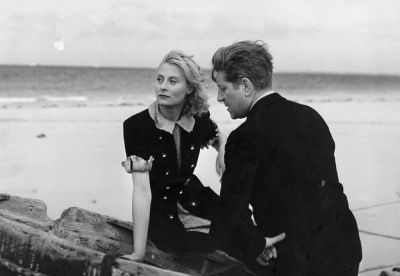
REMORQUES
(Francia/1939-41) R.: Jean Grémillon. D.: 85'. V. francese
Introduce Paul Vecchiali
Cosa c'è di più semplice, in apparenza, della storia del marinaio André Laurent, padrone di un rimorchiatore, che trascorre la sua vita fra il mare e sua moglie, la fragile Yvonne? Cosa c'è di più anodino di una coppia unita che si disfa per stanchezza? Cosa di più banale di un'avventura extraconiugale? Sì, André incontra Catherine, portata dalla tempesta mentre era intrappolata in una nave in pericolo. E tutto precipita. Ma il Destino veglia: Yvonne muore, Catherine se ne va. Dagli scintillii luminosi nell'acqua fino agli incanti finali che attirano André verso la sua barca per andare di nuovo in mare a salvare altre navi, il film non cessa, inquadratura per inquadratura, di attingere alle emozioni più alte, di battere come batte un cuore, anche affaticato, anche logorato al punto da non poter più assolvere le sue funzioni. Come il cuore di Yvonne. [...] Remorques è un film d'amore sull'Amore, profondo, violento, crudo. I sentimenti vi sono espressi frontalmente con, quale unico décalage, una poesia sarcastica che denuncia l'infelicità sfidandola. Dietro, non molto lontano, vibra una sorta di opera lirica dove si instaura la Parabola, evidentemente sostenuta dalla musica e che si articola intorno a un tema fortemente originale: il Richiamo. Il film si apre su un bagliore: la luce freme nell'acqua, tutto è calmo. [...] Il marinaio ha due donne. Una che cova e tutela, passiva e paziente. L'altra, il Mare, attiva ed esigente. L'una che attende. L'altra che non può attendere. Il marinaio vive fra le due donne, trattenuto da una, richiamato dall'altra. Il Richiamo è quindi quest'altra, è anche il lavoro potenziale (niente è mai semplice in Grémillon). Andare verso il mare significa assicurare la sussistenza materiale dell'una, ingannandola con l'altra. Ed è in effetti dal mare che arriva Catherine. Dal mare e dall'inferno. Quando lei decide di lasciare la nave in pericolo e suo marito, risuona una sirena perfettamente sincrona con quanto accade [...]. Mentre il Mare, l'Inferno e Catherine reclamano Gabin, la Morte reclama Madeleine Renaud. La coppia che ci è stata presentata come esemplare si vede tirata tra queste rappresentazioni: Mare, Morte, Amore. Allitterazione sintomatica che porta in sé le sue proprie contraddizioni. Mare, fonte di vita. Morte, volto occulto della Vita. Amore che sostiene e genera la Vita... i segni [...] concernono sia il suono che l'immagine: controluce violenti e dolorosi dove si mescolano l'acqua e il fuoco. Illuminazione del viso della Morgan e del suo sorriso in uno scoppio di tuono dove la bellezza esacerbata è minacciata... rumori di tacchi nella villa vuota... squilli di telefono... Tutte musiche annunciatrici che non dipendono dal Destino ma suonano come una tragedia epurata anche se selvaggiamente devastatrice. Opposizione grandiosa fra il mito Gabin-Morgan, la Sirena e il Marinaio, e il quotidiano.
(Paul Vecchiali, L'Encinéclopédie. Cinéastes 'français' des années 1930 et leur oeuvre, Éditions de l'oeil, Montreuil 2010)
What could be simpler than the story of the sailor André Laurent, the owner of a tugboat who divides his life between the sea and his wife, the delicate Yvonne? And what could be more insipid than a couple splitting up out of weariness? What could be more banal than an affair? Yes, André encounters Catherine, brought in by a storm after being trapped on a ship in distress, and everything begins to fall apart. But fate dictates: Yvonne dies, Catherine departs. From the water's bright reflections, to the final spells that lure André toward his boat to go back out to sea and save more ships, the film, take after take, continues to evoke deep emotions. It beats like a heart, albeit a tired one, worn out to the point of no longer being able to perform its basic functions. Just like Yvonne's. [...] Remorques is a love film about Love. Deep, violent, raw. Emotions are expressed head-on, with the only exception being a sarcastic poem that questions and criticizes unhappiness. Not far off in the background a sort of lyrical opera where the Parable introduced vibrates, clearly supported by music and articulated around an original theme: the Summoning. The film opens with flare: lights quiver on the water, everything is calm. [...] The sailor has two women. One, he nurses and protects. The other, is the Sea, busy and demanding. One waits, one can't wait. The sailor lives between the two women, held back by one, summoned by the other. The 'summoning' therefore is represented by the sea, which also represents his potential livelihood (nothing is ever simple in the work of Grémillon). To go to the sea means assuring the livelihood of one woman, while betraying her with the other. And Catherine, in fact, comes from the sea. From the sea and from hell. When she decides to leave both the ship and her husband, a siren rings timed perfectly with the action [...]. While the Sea, Hell, and Catherine call to Gabin, death claims Madeleine Renaud. The exemplary couple is torn between these representations: Sea, Death, Love, a trilogy that epitomizes contradictions. The Sea, a source of Life. Death, the dark side of Life. Love that nurtures and generates Life... the references [...] relate to both sound and images: violent and painful backlit shots where water mixes with fire. The lighting on Morgan's face and her smile during a flash of thunderbolt where exasperated beauty is threatened... the sound of heels walking in an empty villa... a phone ringing... all are a sort of heralding music that does not depend on Fate but rather signals a muted but savagely destructive tragedy. There is a spectacular contrast between the mythical Gabin-Morgan, the Siren, the Sailor, and the everyday.
(Paul Vecchiali, L'Encinéclopédie. Cinéastes 'français' des années 1930 et leur oeuvre, Éditions de l'oeil, Montreuil 2010)

Tariffe:
Aria condizionata
Info: 051224605











